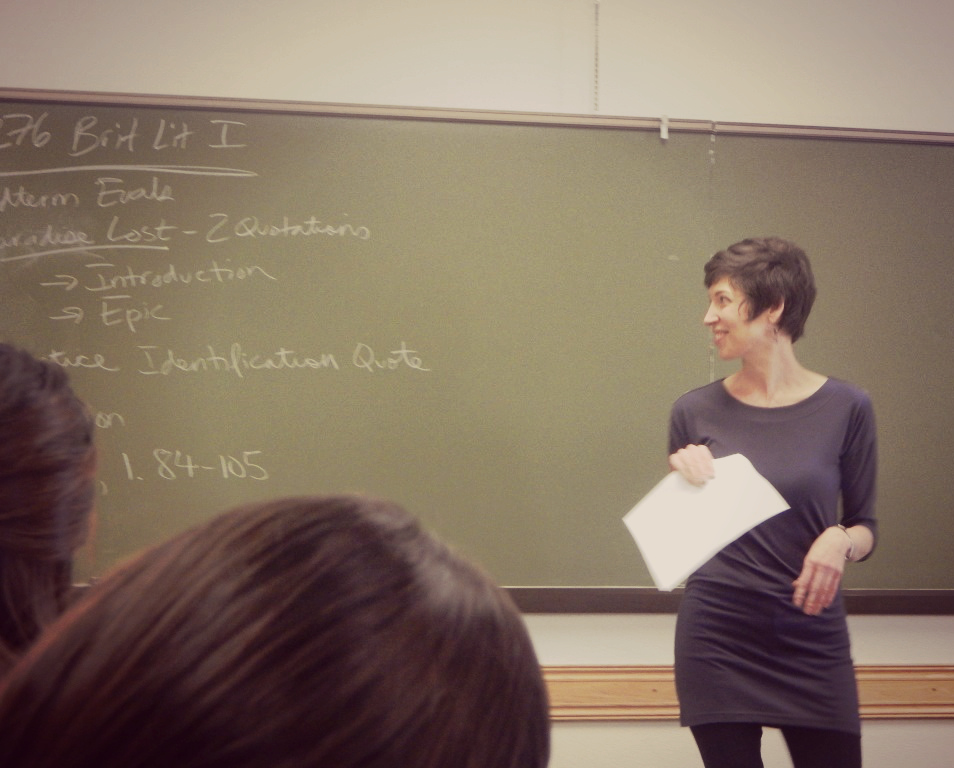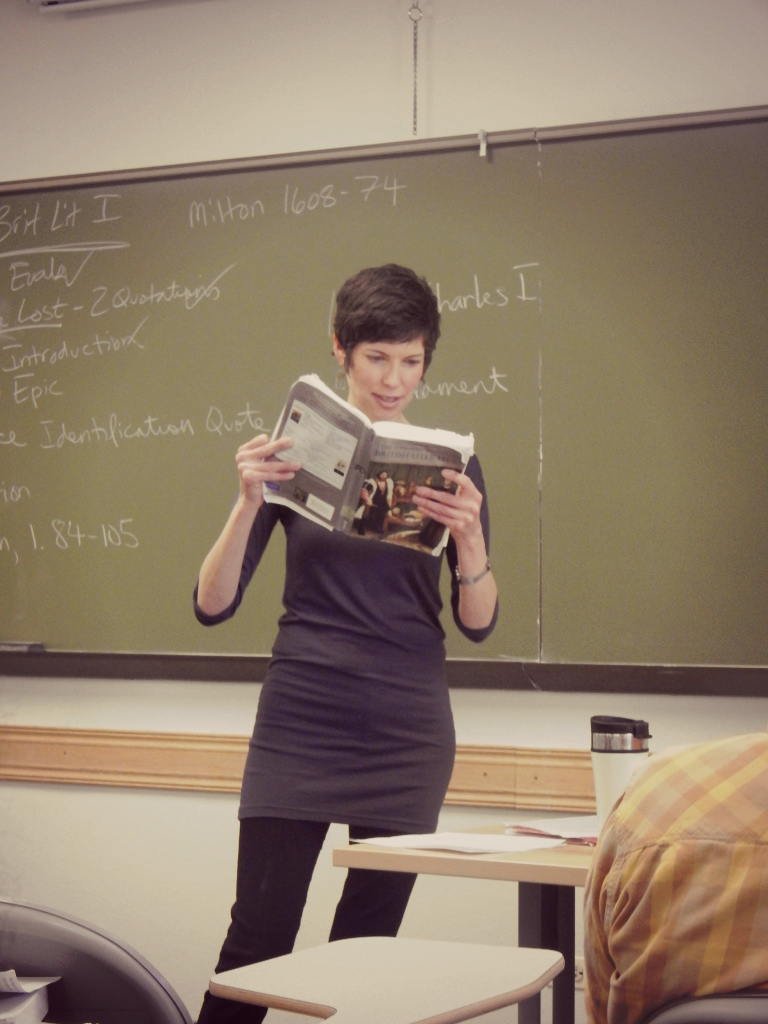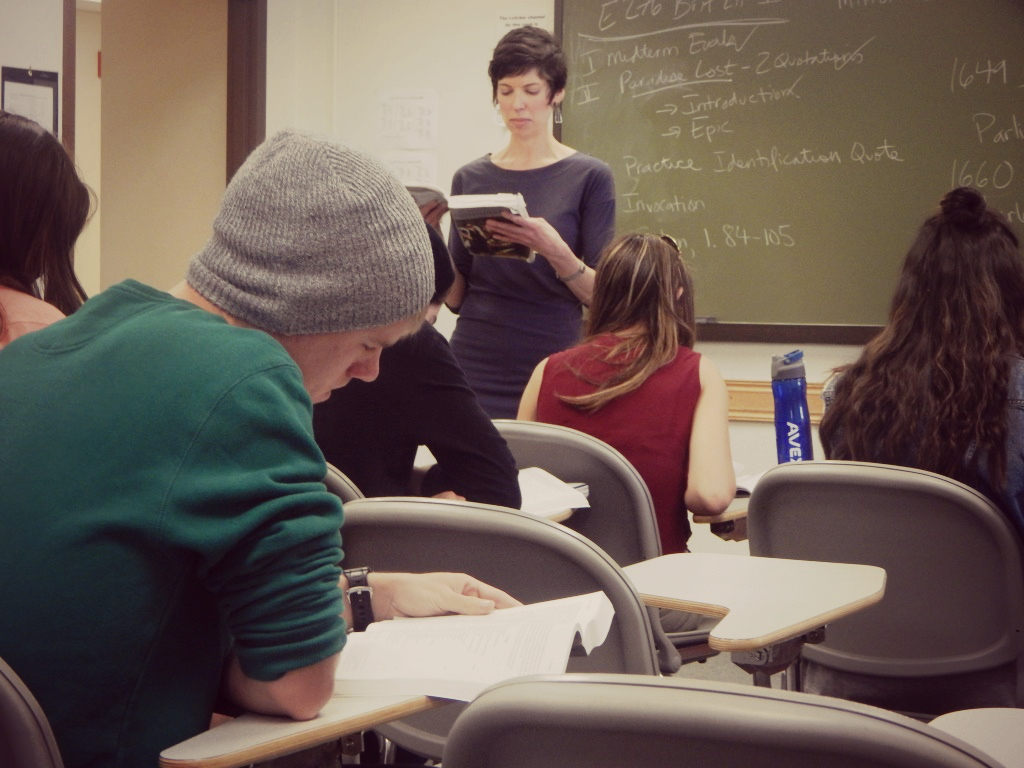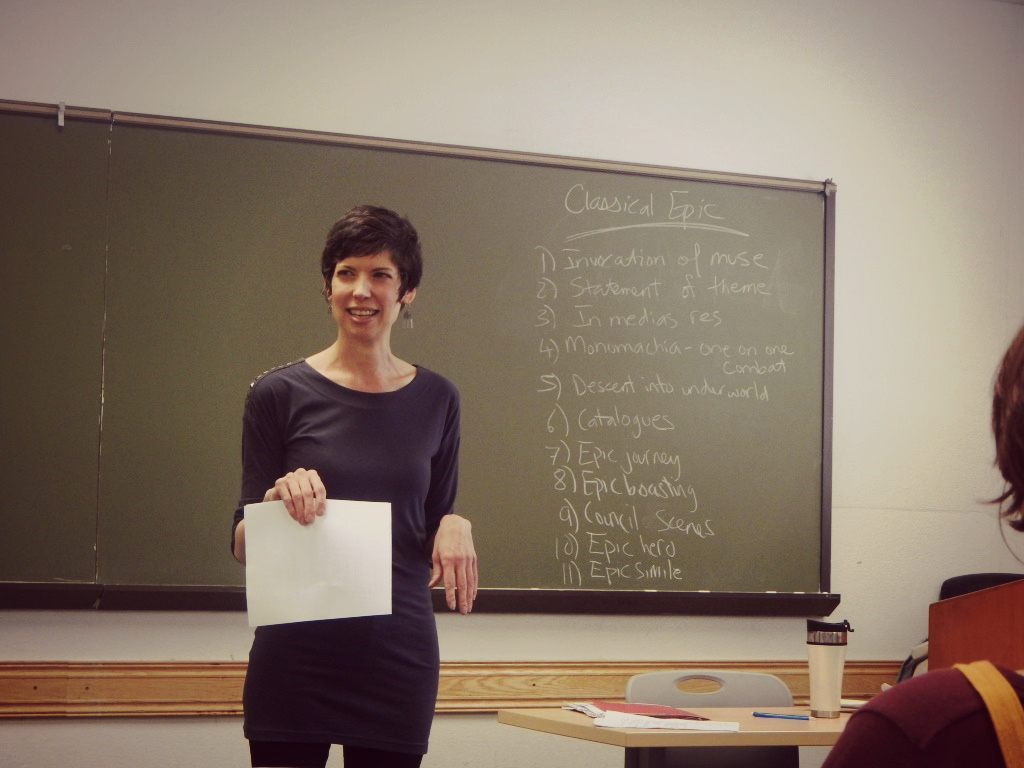“I firmly believe that in terms of teaching critical thinking skills and challenging students to imagine cultural and ethical situations that might differ from their own perspectives, nothing beats the humanities.” Read more: Faculty Profile: Lynn Shutters
Lynn Shutters, Special Assistant Professor, Literature.
B.A., English, University of Virginia; M.A. and Ph.D., English, New York University.
Dr. Shutters teaches early literature and women and gender studies at CSU. Her academic interests include representations of love, sex, and marriage in medieval literature; representations of non-Western peoples in medieval literature; medievalism; and feminist and queer theory.
How would you describe your work in the English Department?
My main work is as a teacher – I offer a wide range of courses, including British Literature I, Shakespeare, medieval literature classes, Modern Women Writers, Literary Theory, and I’ve also offered a capstone titled “The Marriage Plot.”
My job also involves research, meaning that I publish in my research fields of medieval literature and gender studies. I just finished editing a book last semester entitled Teaching Medieval and Early Modern Encounters.
What brought you to CSU?
Actually, I’m half of an academic couple; my partner, Leif Sorensen, was hired in CSU’s English Department in 2009. After being long distance for 4 years and working in different states, we decided that CSU and Fort Collins were a good fit for us.
What do you enjoy most about your work?
I really enjoy introducing students to older literature that they might not expect to find all that interesting – I taught a class on Medieval Women Writers in the Fall 2014 semester, and I think a lot of students were surprised to see how fascinating and thought-provoking medieval literature could be.
I also enjoy working with students on writing. Sometimes students think that they either are or aren’t good writers, and if they’re not, there’s not much to do about that. I encourage them to view writing as an attainable skill, not an innate ability, and I enjoy seeing their sense of accomplishment as their writing skills improve.
Why are the Humanities important?
I have a lot of opinions on this one, especially as a professor of early literature in an era when medieval studies is being cut from some curricula.
I firmly believe that in terms of teaching critical thinking skills and challenging students to imagine cultural and ethical situations that might differ from their own perspectives, nothing beats the humanities.
To draw from my own field, medieval studies, I ask students to consider how naturalized concepts like “race” and “gender” might have been constructed differently in the past and to then ponder the significance of those differences. Conversely, I ask students to see how present-day beliefs and social structures developed out of the past. For example, even though we imagine love and marriage to be really different in the Middle Ages (and in many ways, they were), Western formulations of love and marriage today are nonetheless deeply indebted to the medieval past. We’re sometimes a very present-minded culture, but I think that knowing where cultural ideas come from can help you figure out what you value in your own culture and what you might want to change.
What inspired you to pursue a degree in English, the Humanities?
I always really enjoyed studying literature, so for me it was something of a natural fit. In college, one of the things I really enjoyed about the English major is that I was challenged to actually formulate my own ideas and present those ideas in an interesting, thought-provoking way. Rote memorization wasn’t really part of my experience as an English major, and, as an English professor, I continue to emphasize critical thinking, ideas, and writing.
What had the greatest influence on your career path?
That’s hard to say. I would say that my parents’ attitude toward education and careers gave me the freedom to pursue a career that might not seem practical, like graduate studies in English and then a professorship. I had plenty of friends in college whose parents basically told them that they had to be pre-med. My parents were incredibly supportive of whatever I wanted to do, although they always emphasized that I needed to be aware of the consequences of my decisions. For example, academia is not a high-paying career, but that’s a trade-off that I was willing to make.
What did you want to be when you were a kid?
I’m trying to remember – I loved drawing and think that I imagined that I could be an artist when I was about 7. When I was in high school, I wanted to be a lawyer. My original plan starting college was to major in English as an undergrad and then go to law school, and plenty of my friends actually did that. However, I ended up continuing with English.
What special project are you working on right now?
A bunch – as an academic you usually have, or try to have, a few different projects going. I’m currently trying to finish an article on two medieval authors, Christine de Pizan and Boccaccio. It’s taken a while, because they’re French and Italian, respectively, so this research is a little further afield from my usual work on Middle English literature and authors like Chaucer.
What moment in the classroom stands out as the most memorable?
That’s hard – I don’t know if I can identify one moment. I would say that I’m often surprised and impressed by how “game” my students are. I tend to throw a lot at students – lots of reading, complex critical articles. I remember teaching a critical reading last semester, for example, on the twelfth-century French poet Marie de France. The author of the reading assumed that his audience had all kinds of background knowledge that my students, as undergraduates, simply wouldn’t have. Yet the students were so game to discuss the reading anyways – those moments stick in my mind.
What is your favorite thing to teach? Favorite thing about teaching?
I love teaching a lot of things, but as mentioned above, I really enjoy teaching medieval literature, partially because it’s so strange and unpredictable given many students’ expectations of literature. I sometimes tell students, if you want weird crazy narratives and poetic forms, forget post-modern literature. Go medieval!
What advice would you give a student taking a class in the English Department?
Take advantage of office hours. Many professors are open to working with students one-on-one, and that’s what office hours are for. Even if you feel like you’re a pretty good writer, if you talk to a professor in advance about a paper, you’ll probably do better on it as a result.
What’s the best advice you ever received?
Another tough one – I guess I’d say to try to enjoy academia. There’s so much to enjoy about teaching and research, but it can also be overwhelming. When I made my to-do list for Spring Break – grade midterms, read for a graduate course, peer review an article, finish writing an article, get together proposals for a conference taking place next year, etc. etc., I felt my stomach clench. But I do what I do because I love it, and it’s important to remember that.
What or who inspires you?
Many people, but, for these questions, I’d say Carolyn Dinshaw and Mary Carruthers, the two amazing professors with whom I primarily worked in graduate school; Karina Attar a friend and colleague with whom I put together the volume of essays Teaching Medieval and Early Modern Cross-Cultural Encounters; and, while it may sound cheesy, many of my students. To be specific, right now I’m teaching a graduate course on medieval literature; none of the students have worked all that extensively in this field, and yet, as usual, I’m throwing a lot at them. They’re game, though! Even when some of our critical readings include quotations in languages they don’t know.
What accomplishments are you the most proud of?
For teaching, I’d say how well my Medieval Women Writers class went last semester. It was a tough, demanding course, but students did well and seemed to enjoy it.
For research, finishing the volume of essays Teaching Medieval and Early Modern Cross-Cultural Encounters, which just came out last December.
What was the last piece of writing you read or wrote? OR, What are you currently reading, writing?
I’m in the process of finishing writing the article on Christine de Pizan and Boccaccio, mentioned above. I’m also writing a blog entry for “In the Middle,” a blog for medievalists/people interested in the Middle Ages. (Check it out at http://www.inthemedievalmiddle.com) I’m reading for my courses – students might not believe this, but I always reread anything I’m teaching. So I’ve been immersed in Renaissance sonnets and Chaucer’s Wife of Bath’s Prologue and Tale, plus criticism on the latter. I’m also reading Haruki Murakami’s Hard Boiled Wonderland and the End of the World – it’s a nice change of pace from my usual reading lists. And I’m looking forward to starting Kazuo Ishiguro’s new novel The Buried Giant.
When you’re not working, what do you do?
To be honest, I tend to be a workaholic – I always tell my students, I need hobbies! I do enjoy cooking and baking, running, and playing poker with a weekly poker group. I also love popular culture and can watch almost any awful show on television. I find The Bachelor disturbing yet fascinating, and ditto for MTV’s The Challenge.
What don’t your colleagues know about you?
I really don’t know – I’m pretty straight forward, I think. Maybe they don’t know about my terrible sweet tooth – people often assume that I’m healthier than I am.
What is your favorite word and why?
I don’t really have one. I like odd words or phrases when they come up. In one of my classes last week, for example, we were discussing “Hieronymian hermeneutics.”
Which three people (living or dead) would you invite to dinner?
Now I feel like I’m being forced to participate in a first-day-of-class icebreaker (I guess I deserve it, for inflicting them on my students?) I’d probably say three close friends of mine from college/grad school who are spread all over the country. That’s probably not the most interesting answer, but it’s honest – one of the tough things about academia is that you end up going where the job is, which often means leaving close friends behind.
What’s one thing you dream of being able to accomplish in your tenure at Colorado State University?
I have a few ideas, but I’m afraid I’ll jinx them if I say, so I’ll let you know when/if they happen.



